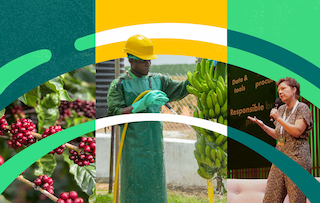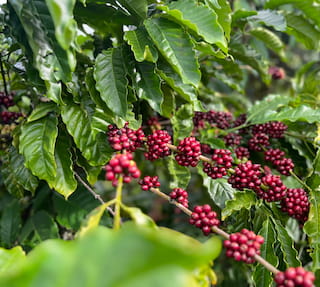IDH 2024 Annual Report: Building resilience and shared value for long-term impact

IDH is proud to release our 2024 Annual Report, which outlines our work with our partners to transform markets: supporting thriving worker and farmer communities and achieving net-zero, regenerative agricultural systems.
2024 marked a year of accelerating action. In close collaboration with our partners, we continued to build resilient, scalable solutions that can endure and adapt to today’s complex global challenges. As the world navigates high environmental, economic, and political volatility, our shared mission has never been more relevant. With our partners, we’re demonstrating that secure and profitable value chains go hand-in-hand with resilience.
Over the past 15 years, we’ve seen that meaningful transformation only happens through collaboration. That’s why we continue to invest in strong partnerships between private sector companies, governments, and civil society and other key stakeholders. In 2024 alone, we worked with 1,030 partners globally and helped establish 162 multi-stakeholder coalitions and platforms, uniting around a common vision on sustainable development or sourcing.
Some highlights from 2024 that you can read more about in our Annual Report:
- Improving livelihoods: Piloted wage top-ups in tea estates, improved working conditions in Kenya’s textile sector, and supported data-driven wage strategies.
- Driving farmer resilience: Expanded financing and income diversification for cocoa and coffee farmers through the IDH Farmfit Fund.
- Investing in innovation: Launched the first Investment Development Hub in Colombia and scaled sustainable cattle ranching in Brazil.
- Supporting climate-aligned trade: Supported countries in meeting EU deforestation regulations—without excluding vulnerable farmers.
Laying the foundation for universal living wages
2024 was a significant year for the living wage agenda. A strong foundation has been built through uniform definitions and guidance, sector and company pilots, and upcoming due diligence legislation such as the EU Corporate Sustainability Due Diligence Directive (CSDDD) and the EU Corporate Sustainability Reporting Directive (CSRD).
Building on this foundation, frontrunning businesses began integrating these concepts into their strategies and making commitments to ensure that their workers are paid at least a living wage. Multi-stakeholder initiatives have emerged in sectors like tea and bananas, alongside individual commitments from brands and retailers, such as voluntary payments to workers. IDH supports these actions through local and global convening, as well as tools and guidance to help stakeholders in global value chains improve their approaches, such as sustainable procurement and due diligence practices.
Interested to know more about how we are driving widespread adoption of living wage principles into industries such as agriculture and apparel, and creating lasting positive impact on workers' livelihoods?

Upscaling sustainable procurement models in cocoa
In 2024, the global agricultural commodities market was valued at USD 230 billion. Despite this, smallholder farmers producing coffee, tea, cocoa and other commodities receive only a small portion of the generated value.
In the past, efforts to improve farmer livelihoods have focused mostly on field-level interventions such as productivity. While helpful, these initiatives alone cannot lift farmers out of poverty. Recognising the need for deeper, systemic change, IDH has championed a shift toward sustainable procurement practices—ensuring farmers earn stable and higher incomes through fair pricing, long-term contracts, and diversified income opportunities.
In 2024, IDH amplified the sustainable procurement agenda through actions such as the statement on sustainable procurement by the National Initiatives on sustainable cocoa (ISCOs) at the World Cocoa Conference, and embedding sustainable procurement into industry norms and through the launch of a procurement position paper by DISCO. These efforts have placed sustainable procurement firmly on the radar of industry leaders, fostering a shared ambition to create meaningful impact.
Learn more about how IDH has been advancing sustainable procurement and scaling living income models in the cocoa sector from the

Towards inclusive EUDR implementation
The EU Deforestation Regulation (EUDR) represents a critical step in combating global deforestation, offering an enabling regulatory framework to protect the world’s forests. However, as companies adapt to meet EUDR’s requirements, the risk of excluding smallholder farmers from European value chains looms.
In response to the EUDR, IDH leveraged its landscape program in Vietnam to facilitate the formation of a public-private consortium to tackle traceability, forest monitoring, and deforestation-free supply chain requirements. This consortium, comprising the Vietnamese government, international coffee companies, and other stakeholders, is a model of pre-competitive collaboration designed to align resources and ensure cost-effective EUDR compliance.
In 2024, IDH worked with stakeholders in other countries to prepare for compliance aligned with EUDR and CSDDD requirements, tailoring approaches to the specific challenges of each region. For example, in Malaysia, IDH is working in collaboration with the Ministry of Plantation and Commodities and the Malaysian Palm Oil Board to meet EU deforestation regulations by the end of 2025.
Interested to read more about how we are co-creating equitable, inclusive, and deforestation-free supply chains.
Read our Better Environment chapter in the IDH Annual Report 2024.
